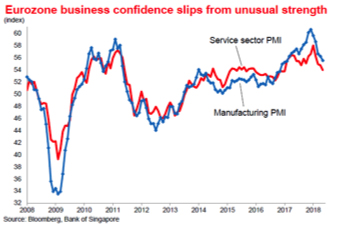28 May 2018
Author: Richard Jerram, Chief Economist, Bank of Singapore, Member of OCBC Wealth Panel
Flash PMIs for May point to a continued slowdown in the Eurozone economy. However, business sentiment remains at healthy levels, suggesting fluctuations in the pace of growth, but not a threat to the underlying expansion.
 To put the current situation in context, the overall PMI of 54.1 is a touch stronger than the 53.5 average of 2015-2016, when GDP growth was running at 1.9%.
To put the current situation in context, the overall PMI of 54.1 is a touch stronger than the 53.5 average of 2015-2016, when GDP growth was running at 1.9%.
We cannot see a fundamental reason for a further meaningful slowdown in Eurozone growth. Government budgets are in balance and the pressure for austerity has faded. The benefits of the structural reform of recent years are filtering through. Monetary policy transmission is improving as stronger banks are better able to boost lending. It looks like the softer patch since the start of this year partly reflects temporary factors such as strikes and weather, and is partly just a correction from exceptionally strong levels.
The ECB is likely to remain focused on the outlook for inflation, rather than short-term fluctuations in growth. As with other regions, Europe is finding inflation relatively unresponsive to tighter capacity conditions.
It looks like the ECB will follow the same playbook as the Fed. This means continuing with asset purchases until well after they seem to be necessary, phasing them out carefully, and then allowing the dust to settle before starting to raise interest rates.
In practical terms, that means that the ECB winds up asset purchases by the end of this year and then raises interest rates in 2Q 2019, or perhaps a little later if inflation still lags. As in the US, any temporary signs of economic weakness are a signal to err on the side of caution, and delay rate hikes. Other developed economies seem to be following the same path, with a soft patch of data pushing back the next rate hike from the UK, Canada and Australia.
Italy does not seem to be a big risk to this outlook. Chaos, inaction and, ultimately, more elections still seems like the most probable outcome, in which case the impact on European growth, policy or financial markets should be limited.
Despite its recent troubles, Italy is still the third biggest Eurozone member, accounting for 15% of the region. It is nine times the size of Greece. The unlikely coalition of two populist parties, from the right and left, appears to have abandoned some of its previous anti-Euro positions, but there are still plans for a major easing of fiscal policy. Considering Italy’s weak public finances, legal barriers and the instability of the government it looks unlikely that they can implement radical change, but there is understandable market concern.
Of course plans for fiscal stimulus are not a problem for short-term growth. The issue is more of an existential one, in the event that Italy reneges on its side of the bargain – fiscal prudence and reform – that was the counterpart to ECB President Draghi’s “whatever it takes” commitment.
Important Information
This material is not intended to constitute research analysis or recommendation and should not be treated as such.
Any opinions or views expressed in this material are those of the author and third parties identified, and not those of OCBC Bank (Malaysia) Berhad (“OCBC Bank”, which expression shall include OCBC Bank’s related companies or affiliates). OCBC Bank does not verify or endorse any of the opinions or views expressed in this material. You should beware that all opinions and views expressed are subject to change without notice, and OCBC Bank does not undertake the responsibility to update anyone with any changes to the opinions and views expressed.
The information provided herein is intended for general circulation and/or discussion purposes only and does not contain a complete analysis of every material fact. It does not take into account the specific investment objectives, financial situation or particular needs of any particular person. Without prejudice to the generality of the foregoing, please seek advice from a financial adviser regarding the suitability of any investment product taking into account your specific investment objectives, financial situation or particular needs before you make a commitment to purchase the investment product. In the event that you choose not to seek advice from a financial adviser, you should consider whether the product in question is suitable for you.
OCBC Bank is not acting as your adviser. This material is provided based on OCBC Bank’s understanding that (1) you have sufficient knowledge, experience and access to professional advice to make your own evaluation of the merits and risks of any investment product and (2) you are not relying on OCBC Bank or any of its representatives or affiliates for information, advice or recommendations of any sort except for specific factual information about the terms of the transaction proposed. This does not identify all the risks or material considerations that may be associated with any of the investment products. Prior to purchasing the investment product, you should independently consider and determine, without reliance upon OCBC Bank or its representatives or affiliates, the economic risks and merits, as well as the legal, tax and accounting characterisations and consequences of the investment product and that you are able to assume these risks.


